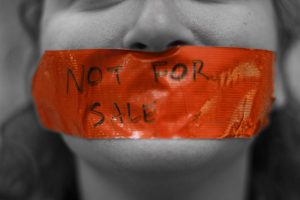A’sha Noble
Opinion Staff Writer
[email protected]
You are tied up either physically, mentally or both and have no idea where your family is or how far away from them you are. You have been having sex with strangers for months unwillingly since you were kidnapped from that parking lot.
There are screams but no one is there to save you from what now has become your everyday life. This is the life of many sex and human trafficking victims.
Someone’s loved one is tied up right now being forced to participate in non-consensual sexual acts. Most things in this world can only be sold once, while a person’s body can be sold over and over again.
To traffickers, a body is equivalent to money. Many victims are never saved and stay in the trafficking business until the day they die or escape. Men, women and children are all victims of human and sex trafficking.
Project WEST NC Coordinator at Our VOICE Kat Andberg said systematic oppression allows for trafficking.
“Most people are trafficked because they have a basic need that is unmet — they are food insecure, housing insecure, have a substance use disorder, have mental health or physical health issues, lack basic health care, they do not have access to good paying job or child care, they don’t have a family or have an abusive family, they didn’t have access to a good education, they are ostracized or experience social bias because of some part of their identity such as being a person of color, LGBTQIA+, having limited English skills, being undocumented,” Andberg said.
The U.S. Department of Homeland Security’s definition of human trafficking is “Modern-day slavery and involves the use of force, fraud, or coercion to obtain some type of labor or commercial sex act.” Human trafficking and sex trafficking can be used interchangeably but are different.
According to the Polaris Project, human trafficking is a multi-billion dollar criminal industry denying freedom to 20.9 million people around the world. Imagine millions of people standing in front of you enslaved. The Polaris Project is an organization that works to prevent and stop sex trafficking and human trafficking with resources such as The National Human Trafficking Hotline.
According to the Polaris Project, The Hotline’s mission is to get victims in contact with survivors and to create a sense of understanding and support. The Hotline provides help and services in order to keep victims safe and end human trafficking all together.
Sex trafficking takes places everywhere in the world and oftentimes in your own backyard. I know for a fact that sex trafficking is taking place in my backyard, my hometown Wilmington.
While driving in my hometown, I think about the people that may be in the homes and businesses I am passing, and if they need my help and I just can’t hear them. In Wilmington we have many cases of sex trafficking due to its location on the water, allowing a quick and easy way to get bodies in and out.

According to the FBI, there are four types and categories of trafficking which include, but are not limited to, domestic sex trafficking of adults, sex trafficking of international adults and children, forced labor and domestic servitude.
According to the National Human Trafficking Hotline, there were 221 total cases of sex trafficking reported by the state of North Carolina in 2017. The nature of the crime itself leads to trafficking often being underreported.Victims are either scared to come forward or not ready to do so which is understandable considering the stigma surrounding it.
“Human trafficking is also much more nuanced and grey than people realize. Most people do not label themselves as a survivor of trafficking. They don’t see themselves as exploited because it is often someone they love or care about trafficking them. The relationships in trafficking are complex and sometimes whole families or communities have trafficked each other as a means to survive,” Andberg said.
Victim shaming and blaming does not go away even when individuals were not given a choice. I think understanding how trafficking works makes all of the differnece. If you are given proper knowledge and training I feel as though you are less judgemental and more caring at that point.
“That is why it is often hard for the law to convict and find traffickers because those surviving it sometimes protect their traffickers because they care for them. Many survivors are not chained down as the media would have you think but the systematic oppression of our culture means that they do not have other opportunities or that it is not easy for them to leave. This also makes cases hard to be tried in court,” Andberg said.
The U.S. Department of Homeland Security holds traffickers accountable for their actions to the fullest. It is the department’s responsibility to investigate human trafficking, arrest traffickers and protect victims. They also provide immigration relief to non-U.S. citizen victims of human trafficking, encouraging victims to feel comfortable coming forward and working with law enforcement.
Our criminal justice system is not set up to prevent sex trafficking from occurring but to react to the crime once it already took place. When convictions are not made, either there was not enough evidence in order to continue with the legal process or the witness was not deemed good enough by the courts.
“Many human trafficking survivors have substance use disorders or other disorders because of their trauma that makes their stories non-linear and people will not believe. Many survivors have also been labeled as criminals themselves because they may have been charged with prostitution or other charges related to their trafficking situation. Trials often retraumatize them by making them retell their stories and have painful scrutiny by attorneys,” Andberg said.
Force, fraud or coercion need not be present if the individual engaging in commercial sex is under 18 years of age, according to the National Human Trafficking Hotline center.
“Our human trafficking project has only been running a little over a year, so we cannot truly report trends yet, but we do know some factors that can make a person vulnerable to trafficking. People of color, people who identify at somewhere in the LGBTQIA+ spectrum, people in foster care or who have been in foster care, people who have experienced prior abuse, people who are homeless, people with substance use disorder, and people who have a disability of some kind are more likely to experience human trafficking,” Andberg said.
The prevalence of human trafficking in North Carolina is due to many factors, including the major highways that run through our state, a large, transient military population surrounded by sexually oriented businesses, numerous rural agricultural areas with a high demand for cheap labor and the increasing number of gangs in the state, according to the NC Department of Administration.
There have also been cases of adolescents being sold into the sex slave trade by their own friends and partners. It is important to always be aware of your surroundings and truly get to know the people you find yourself spending time with. In college we tend to be free and feel the most comfortable around other college students. We are prey and people are watching and counting on us to get drunk and go into a bathroom alone or even walk alone at night. We don’t need to be paranoid, we just need to be aware.
If you or anyone you know is a victim of sex trafficking, it is important to speak up. This is an uncomfortable topic for people to talk about but it is important to educate yourself and your peers on. You could be the one who saves someone’s life.
The Western North Carolina Human Trafficking Rapid Response Team, Project WEST NC and NC Victim Assistance Network are three local organizations here to help survivors and provide services.
The National Human Trafficking Resource Center, operated by the Polaris Project, is open 24 hours a day, seven days a week at 1 (888) 373-7888. If you have any questions for yourself or even a friend, please call.

















